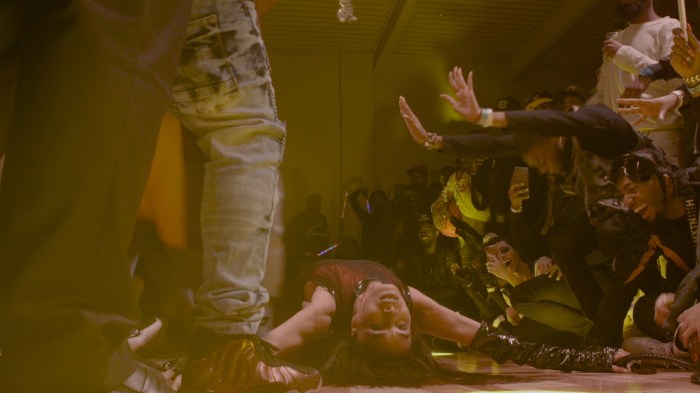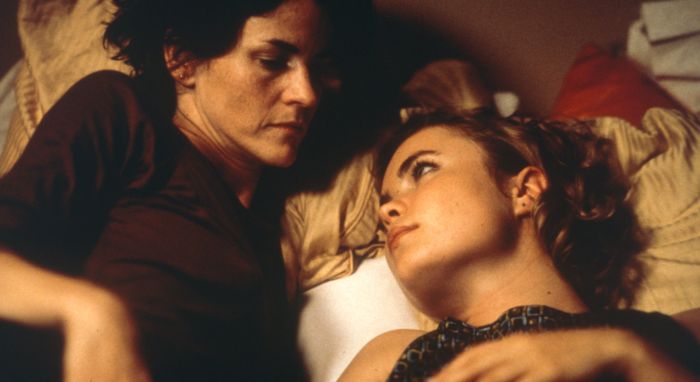Takuya Kimura and Hana Sugisaki in Takashi Miike’s “Blade of the Immortal,” which opens November 3 at the Quad Cinema. | MAGNET RELEASING
Japanese director Takashi Miike has a reputation for ultra-violence. It’s not always deserved. His latest film, “Blade of the Immortal,” is the 100th entry in a filmography that includes movies made for children. One of his best films, “The Bird People in China,” came out straight to video in the US and was never submitted to the MPAA, but it would be probably be a hard PG-13: its characters trip on psychedelic mushrooms and there’s one violent scene that turns out to be a dream.
But his consensus masterpiece and American breakthrough is “Audition,” in which a woman tortures a man and amputates one of his legs for assuming that she’s a submissive doormat. The very next Miike film I saw, “Ichi the Killer,” is even nastier and seems misogynist rather than feminist: it includes an extended interlude where a man is hung by hooks through his flesh and splattered with burning cooking oil, plus several rape scenes. It moved the British board of film censors from their usual job of simply rating films to demand that several minutes be cut for UK release. In fact, American Miike fans are lucky that there’s no legal requirement for US distributors to submit their films to our MPAA, as there is for its equivalents in Canada and most of Europe.
In “Blade of the Immortal,” Manji (Takuya Kimura) is shown killing 100 bounty hunters after they murder his sister Machi (Hana Sugisaki) in front of him in a black-and-white prologue. He gains immortality by having an old lady put “bloodworms” — what exactly these are is never explained — in his body. Fifty years later, Rin (also played by Sugisaki) asks him to be her bodyguard. The daughter of the owner of a fencing school, she survives her father’s murder. Initially, he refuses her request, but after she begs him, he takes her seriously. Together, they move toward a confrontation with the film’s villain, Anotsu (Sota Fukushi).
Takashi Miike’s latest film spills plenty of blood but suggests a quest for justice
“Blade of the Immortal” uses its protagonist as a punching bag, quite blatantly. His protection from death allows Miike to depict violence toward him with glee. It’s not that Manji doesn’t suffer any consequences: he has lost one eye and his face is heavily scarred. But Miike manages to combine a very obvious pleasure in bloodshed — even a downright fetishism of it — with a sense of pain and loss. Manji doesn’t always succeed. The character may be immortal, but the actor who plays him obviously isn’t, and he performed in winter, during which the film shoot took place, wearing skimpy costumes and doing difficult tasks while made up to be half-blind. This tension comes through clearly.
Manji and Rin’s bond creates a humane dimension of warmth within the film. Beyond the typical revenge fantasy — whose tropes “Blade of the Immortal” admittedly does partake in — there’s a real yearning for justice in Manji’s quest. He’s not far from many Akira Kurosawa heroes, and in fact the spirit of Kurosawa hovers over this film, as over-the-top as it is. Much of Miike’s work feels completely disconnected from classical Japanese cinema. That’s not the case at all with “Blade of the Immortal.” I went in expecting a B-movie, and I saw a modern samurai epic (at 140 minutes).
There’s nothing repulsive or offensive in “Blade of the Immortal” a la the torture scene in “Ichi the Killer” or the scene in “Dead or Alive” where a junkie drowns in a pool of water filled with feces. But in terms of the sheer amount of blood spilled, this may be Miike’s most violent film yet. The manga from which it was based ran for 19 years in Gekkan Afternoon magazine, and while I’m assuming “Blade of the Immortal” couldn’t possibly adapt the entire story, it has a deliberately excessive quality.
According to Kimura, Miike said before every major scene, “Everyone, the scene we’re about to take now is a battle to the death.” The climax features 300 extras. If you’re bothered by “Blade of the Immortal’ and suspect it would benefit from a more subtle approach, think of it as kin to the hyperbolic rhetorical excess in a rock band like Viking metal artist Bathory.
In any case, Miike has now completed film #101, which awaits release and whose title leaves me rather baffled: “Jojo’s Bizarre Adventure: Diamond Is Unbreakable — Chapter I.”
BLADE OF THE IMMORTAL | Directed by Takashi Miike | In Japanese with English subtitles | Magnet Releasing | Opens Nov. 3 | Quad Cinema, 34 W. 13th St. | quadcinema.com































